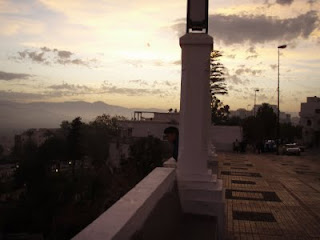November 27, 2009
5 a day
November 25, 2009
Small victories

And yesterday my Arabic teacher elicited my most meaningful thought in Arabic so far. Well, it came out of a conversation as I was packing up my things.
Me: Al-an mada? (Now what? as in, What are you doing now?)
Fatima: Alan-an, dars. (Now, a lesson)
Me: Ma man? (With whom?)
Fatima: … something... (Two Spanish people)
Me: Limada yadrus alarabiya? (Why are they studying Arabic?)
Fatima: Liana …something... yaskununa fi Ceuta wa…something... Maghrebi. (Because they live in Ceuta and interact with Moroccan people)
Me: Oh.
Fatima: Maryam, limada anti tadrusina alarabiya? (Mary, why are you studying Arabic?)
Me: Liana...ana... uridu an aamal ma ashkhaz… [here Fatima filled in ‘Arab world’] fi medinati fi Canada. (Because I want to work with people from the Arab world in my city in Canada).
:)
5 a day
November 22, 2009
From the The Sheltering Sky

He did not think of himself as a tourist; he was a traveller... Whereas the tourist generally hurries back home at the end of a few weeks or months, the traveller, belonging no more to one place than to the next, moves slowly, over periods of years, from one part of the earth to another. Indeed, he would have found it difficult to tell, among the many places he had lived, precisely where it was he had felt most at home... another important difference between tourist and traveller is that the former accepts his own civilization without question; not so the traveller, who compares it with the others, and rejects those elements he find not to his liking.
'If I watch the end of a day--any day--I always feel it's the end of the whole epoch. And the autumn! It might as well be the end of everything,' he said. 'That's why I hate cold countries, and love the warm ones, where there's no winter, and when night comes you feel an opening up of the life there, instead of a closing down. Don't you feel that?''Yes,' said Kit, 'but I'm not sure I prefer the warm countries. I don't know. I'm not sure I don't feel that it's wrong to try to escape the night and winter, and that if you do you'll have to pay for it somehow.'**'You are here with your wife?' asked the Lieutenant. Port assented absently. 'That's it,' said the Lieutenant to himself. 'He's having trouble with his wife. Poor devil!' It occurred to him that they might go together to the quartier [brothel area]. He enjoyed showing it off to strangers. But as he was about to say: 'Fortunately my wife is in France-' he remembered that Port was not French; it would not be advisable.**[Just after Port dies] She did not recall how they had agreed that one can be anything but anything but dead, that the two words together created an antinomy. Nor did it occur to her how she once had thought that if Port should die before she did, she would not really believe he was dead, but rather that he had in some way gone back inside himself to stay there, and that he would never be conscious of her again; so that in reality it would be she who would have ceased to exist, at least to a great degree.
November 21, 2009
5 a day
November 20, 2009
Un dia en el español


November 19, 2009
November 18, 2009
All in the wind



November 13, 2009
Jooj

November 12, 2009
FML
November 10, 2009
I want blood.

November 9, 2009
Flowers for the good life

November 8, 2009
The costs of things, Part 3

November 7, 2009
The costs of things, Part 2

November 6, 2009
The costs of things, Part 1


